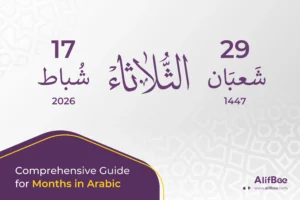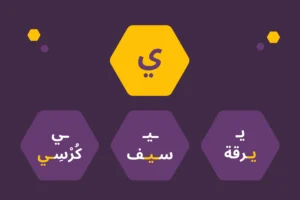10 Arabic Podcasts for Arabic Learners: Complete Guide with Tips
Feeling a little bit confused is totally normal once you embark on your journey of learning Arabic. You might think that you are unable to comprehend Arabic texts at first, and some listening audio might sound too advanced for your level.
Also, you might be wondering which dialect you should pick. Well, you are not alone. Your concerns are valid. Most of the learners have been through your experience, and that’s why we’re here.
We are here to guide you and walk you through the whole process so that you never feel lost. First, I want you to rest assured since there is no need to understand every single word to benefit from Arabic podcasts. Listening —even when it’s passive—helps you get used to the rhythms, sounds, and common expressions of the language. The more you are exposed to the language, the more you can recognize patterns, and the more your vocabulary grows. Thus, your self-confidence is boosted.
In this article, we will provide you with simple, effective strategies to make podcast listening a rewarding experience. We also created a list of 10 best podcasts for Arabic learners.
Still wondering where to start? Then look no further. The AlifBee Podcast is designed especially for Arabic learners. It’s clear, well-structured, and easy to follow, making it ideal for all levels, including the beginner, intermediate, and advanced.
Now, let’s dive in and learn more about how you can have an enriching learning experience of Arabic.
Why Podcasts Are a Great Way to Learn Arabic
Learning Arabic can feel overwhelming at times. Grammar rules, long vocabulary lists, and dense textbooks can be very challenging for some. But this isn’t the case for everyone. Podcasts offer a simple and flexible way to improve your Arabic anytime and anywhere.
Here’s why they’re so helpful:
1. They Fit Into Your Daily Life
You are not required to have your own quiet space or extra study time to learn. With Arabic podcasts, you can learn while doing everyday activities such as cooking, driving, walking, or even getting ready for the day. Just put in your headphones and learn as you go. It’s an easy way to stay consistent without stressing over a tight schedule.
2. They Help You Learn New Words
Listening to podcasts in Arabic allows you to hear how the language is really spoken. You’ll grasp new words, get a sense of everyday expressions alongside natural sentence patterns. Whether the speaker uses Modern Standard Arabic or a local dialect, you will be exposed to the language as people actually use it in real-life contexts.
3. They Improve Your Pronunciation
Even if you’re not able to pronounce words correctly, just listening often helps train your ear. You start to hear the correct sounds, rhythm, and tone of Arabic.
Over time, it’s easier for your brain to recall what it hears. This process is called “ear memory.” You start to mimic the exact way words are pronounced, and thus your accent improves.
Moreover, you can also check out this guide on how to improve your Arabic accent.
4. They Introduce You to Different Dialects
The way Arabic is spoken differs from one place to another. Listening to our tailored content of our podcast helps you explore the different dialects, be it Egyptian, Levantine, or Gulf Arabic, in addition to certain Modern Standard Arabic.
5. They Help You Feel More Confident
The more you listen, the more comfortable you’ll feel. You’ll start to recognize common phrases, understand more, and even predict what comes next in a conversation. As a result, you end up boosting your self-confidence as a learner, and learning turns out to be an interesting experience.
Tips to Learn Effectively Through Arabic Language Podcasts
Arabic language podcasts are a great way to learn, but you need to make sure you stay committed and dedicated to your goals.
Here are a few simple tips to help you get the most out of each episode:
1. Start by Listening Passively, Then Actively
In the early stage of learning, you are not required to do anything but listen. Only listen. Let the sounds, rhythm, and flow of the language wash over you, even if you don’t understand that much. This helps your brain get used to how Arabic sounds in various contexts.
Then, on your second listen, pay closer attention to details and specific information. Try to catch repeated words, sentence patterns, or expressions.
Passive listening helps you feel familiar; active listening helps you lock in what you’re learning.
2. Follow Along With Transcripts (If Available)
It is recommended to follow the transcript if available. Reading along while you listen helps you connect what you hear to how words look. It’s especially helpful for understanding pronunciation, spelling, and grammar.
Don’t worry about understanding every word; just highlight words or phrases you usually encounter while at the same time try inferring the meaning from context.
3. Try to listen to Episodes more than once for reinforced learning
Repetition is the secret. Being exposed to the same content again and again allows your brain to recognize sounds, words, and patterns more quickly.
In addition, this helps you deal with words you missed before, and sentences will sound more familiar this time.
Don’t rush! Make sure you give your brain enough time to process all of that.
4. Speak or Write About What You Hear
It is really important to apply what you learned, even if it is simple. That could involve saying new words out loud or putting the new phrases in sentences.
You don’t have to exert much effort because the more you practice, the more you learn.
You shouldn’t focus on perfection at the moment. However, you should focus on practicing in simple ways where you can build confidence and fluency over time.
5. Choose Based on Your Goals
You can find tailored content that aligns with your learning needs. Some of the podcasts focus on grammar, others on conversation, culture, or specific dialects.
You need to decide on what you will learn. For example, are you seeking to speak, improve listening, or understand a dialect better? You could choose a podcast that meets your goals to keep you motivated.
Later on, we’ll explore this more in the next section.
6. Stay Consistent
For you to stay connected to the Arabic language, you should devote at least 10 minutes of your time listening to Arabic podcasts. Make it part of your daily routine. Keeping yourself regularly exposed to the language makes a difference. These tiny steps lead to great progress ahead.
How to Choose Arabic Learning Podcasts That Match Your Level
There are a lot of Arabic podcasts for Arabic learners out there, so how to decide which one is fit for your level and interest? Here’s how to choose with confidence:
1. Pick a Podcast That Matches Your Level
- For beginners, some tailored podcasts include slower speech, clear explanations (sometimes in English), and basic vocabulary. They usually provide you with a step-by-step approach to learn.
- For intermediates, there are some podcasts with more advanced features, including faster-paced and more in-depth pure Arabic content. You’ll hear full sentences, learn how ideas are expressed, enhance your knowledge reservoir, and build better listening skills.
- For advanced learners, you can dive into native-level podcasts like news shows, interviews, or storytelling podcasts. These help you fine-tune your ear for real-world Arabic and learn how the language is used in different real-life situations.
2. Choose a Dialect That Fits Your Goals
-
While Arabic comes in many forms, it’s highly important when choosing a podcast to learn arabic to pick a podcast that matches the dialect you want to understand or speak.
- Modern Standard Arabic (MSA) is the standard Arabic version used in media, education, and books. It’s a rich choice if you want a foundation that works across all Arabic-speaking countries.
- Egyptian Arabic is widely common and understandable due to Egyptian TV, film, and pop culture. It’s a good option if you’re interested in media or plan to visit Egypt.
- Levantine Arabic (spoken in places like Lebanon, Syria, Jordan, and Palestine) is popular in conversation-focused learning and is useful for travel or social interactions in those regions.
We recommend you start with the dialect you are most interested in.
3. Match the Content With What You Want to Learn
-
Arabic language podcasts focus on different things. Some teach grammar and vocabulary, while others are more about culture, conversation, or even religion.
You should raise at least 3 questions and answer them:
- Am I learning Arabic to travel?
- Do I want to engage in everyday conversations?
- Which interests me more, religious texts or cultural topics?
If the content sounds appealing to you, we assure you that learning will become easier, enjoyable, and result-oriented. When the podcast content aligns with your interests, learning becomes more enjoyable and more meaningful.
10 Best Podcasts For Arabic Learners
Here’s a carefully selected list of Arabic learning podcasts, designed based on your level and dialect. Whether you’re just starting or looking to sharpen advanced skills, you will find something here for you.
1. AlifBee Podcast
- Level: Beginner to Intermediate
- Dialect: Modern Standard Arabic (MSA)
- Why It’s Great: Designed especially for Arabic learners, uses clear pronunciation, real-life vocabulary, and simple explanations. Created for structured and engaging practice. Listen here.
2. ArabicPod101
- Level: All levels
- Dialect: MSA, Egyptian, Levantine
- Why It’s Great: Offers a variety of short lessons supported with audio, transcripts, and cultural tips. Fit for learners who enjoy diversity and prefer a step-by-step approach. Listen here.
3. Real Arabic
- Level: Intermediate to Advanced
- Dialect: Levantine
● Why It’s Great: Features authentic conversations on everyday topics. Ideal for building listening skills and understanding cultural context. Listen here.
4. Learn Levantine Arabic with Livi
- Level: Intermediate to Advanced
- Dialect: Palestinian‑leaning Levantine Arabic
- Why It’s Great: Features interviews with native Levantine Arabic speakers. You’ll hear real conversations, pick up vocabulary in context, and benefit from native speakers correcting Livi’s pronunciation—making the experience both authentic and encouraging. Listen here.
5. LinguaBoost Arabic
- Level: Beginner
- Dialect: MSA
- Why It’s Great: Short, focused lessons that teach practical phrases and dialogues. Great for daily practice or learning on the go. Listen here.
6. Arabic with Sam
- Level: Intermediate
- Dialect: Egyptian, MSA
- Why It’s Great: Sam offers clear explanations and deep dives into grammar, vocabulary, and even Quranic Arabic. Perfect for learners who want to build solid foundations. Listen here.
7. Coffee Break Arabic
- Level: Beginner
- Dialect: MSA
- Why It’s Great: Relaxed, instructor-guided lessons with English support. Encourages speaking, pronunciation, and real communication skills. Listen here.
8. Kerning Cultures
- Level: Advanced
- Dialect: Mixed (Levantine, Gulf, and more)
- Why It’s Great: A beautifully produced storytelling podcast that tackles interesting topics including culture, identity, and everyday life in the Arab world. Perfect for immersive, real-world listening. Listen here.
9. Talk In Arabic
- Level: Beginner to Advanced
- Dialect: Egyptian, Levantine, Moroccan, MSA
- Why It’s Great: Offers a wide range of dialects and topics with slow, clear audio. Great for learners exploring regional Arabic varieties. Listen here.
10. Easy Arabic Podcast
- Level: Intermediate
- Dialect: MSA
- Why It’s Great: Casual, unscripted conversations that help you build natural listening skills. Subtitles available. Great for picking up vocabulary and expressions. Listen here.
Conclusion
Keep in mind that Arabic language podcasts can do magic! They are a way to bring the language into your daily life without stress. There is no need to sit down with a book or follow a strict schedule. All you need to do is to press play, and you’re learning.
Even when you’re busy, there is always a space to learn! 10 minutes of listening while cooking or commuting can help you internalize knowledge. This can lead to great results in the long run.
If you’re ready to keep growing, don’t miss our 10 Top Tips to Learn Arabic from Polyglots for tried-and-true advice. And for more structured practice along with your podcast routine, give the AlifBee app a try.
Following the right techniques makes learning Arabic an unforgettable experience!









